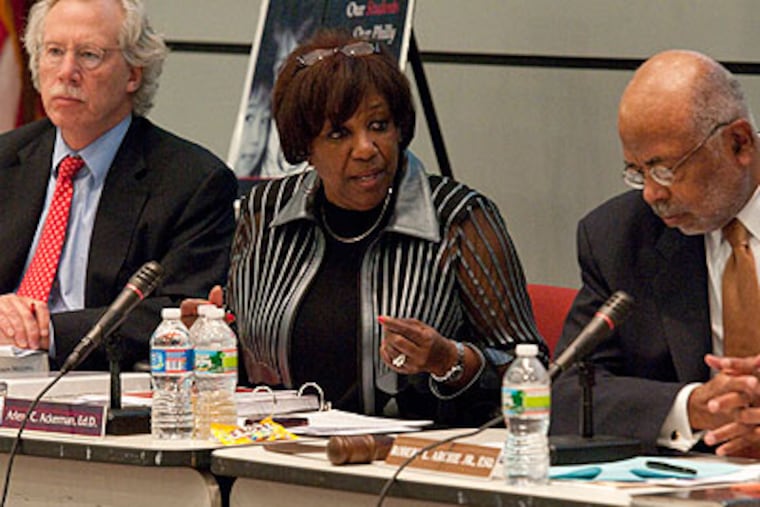New budget won’t stop Phila. school cuts, SRC told
Even if a new budget proposed by Harrisburg Republicans passes and some funds are restored to education spending, the Philadelphia School District will still face a $610 million gap next year, officials said Wednesday.

Even if a new budget proposed by Harrisburg Republicans passes and some funds are restored to education spending, the Philadelphia School District will still face a $610 million gap next year, officials said Wednesday.
Chief Financial Officer Michael Masch broke the news at a School Reform Commission meeting. Under Gov. Corbett's proposed budget, the district would have to make $629 million in cuts, including losing more than 3,000 jobs, slashing transportation, ending full-day kindergarten, and cutting programs.
The district is set to lose $292 million in state aid, in addition to the loss of federal stimulus funding. The counterproposal would increase the district's state funding by 2 percent over Corbett's plan, Masch said.
"Even with that, we will still need to implement all of the components of our gap-closing plan in order to achieve a balanced budget next year," he said.
When Chairman Robert L. Archie Jr. asked what the SRC could do, general counsel Michael Davis reminded officials they had the power to cancel or renegotiate all collective-bargaining agreements.
If the district does not get $75 million in concessions from its unions, the budget gap will worsen, officials said. Jerry Jordan, president of the Philadelphia Federation of Teachers, has said he is not willing to renegotiate.
A number of parents told the SRC to consider minimizing cuts to specific programs.
Mirna Ramirez, a South Philadelphia mother with children in public schools, said she worried about cuts to services for English-language learners. The budget proposes cutting money for tutoring and supplies, as well as eliminating some bilingual teachers, bilingual counselor assistants, and one "Newcomer Learning Academy" for immigrant students.
"How will these teachers be able to support all of the special needs of all of the children in the classroom?" Ramirez asked. She invited officials to hold a meeting for the immigrant community.
Bonnie Raines, a volunteer with the nonprofit Public Citizens for Children and Youth, urged the SRC to consider limiting cuts to art and music.
"Kids need art," Raines said. "It sparks their imagination and feeds their spirits. It improves their academic performance and encourages them to stay in school."
Student Shayla Johnson, a senior at Overbrook High, asked the district to reconsider its safety spending.
"We have already wasted enough money on surveillance cameras," Johnson said. "I know that at Overbrook, it really didn't help. Cameras are not the answer - people are."
The district should invest funds in proven programs, such as restorative practices and peer mentoring, which cost little but have real benefits, Johnson said.
Several members of the activist group Action United spoke at the meeting, accusing the district of budgeting poorly. The near-elimination of transportation services and wipeout of extended-day programs would harm thousands of needy students, they said.
Superintendent Arlene C. Ackerman "and the SRC need to stop blaming everything on Harrisburg," parent Alicia Dorsey said.
Ackerman defended the district, saying that it spent federal stimulus funds the way they were intended and that difficult cuts could not be avoided.
"I say to you, everybody's feeling a little bit of this pain," Ackerman said. "We're trying to do what's in the best interests of all of the children."
One program that will operate much as usual is summer school, officials said at the meeting. Ackerman significantly expanded summer school last year.
This year, the district will spend $22.9 million on summer school, less than the $40.3 million it spent in 2010-11. But it will be able to serve the same number of students, up to 39,000, Masch said, because of savings.
"That's our team being smart," Masch said.
Though the budget picture may worsen, summer school is a lock this year, Masch said.
"By the time we know about that, it will be too late to stop summer," he said.
At the meeting, Ackerman also announced the departure of one of her top deputies. David Weiner, associate superintendent for academics, is leaving to become deputy chancellor of talent, labor, and innovation with the New York City school system.
Ackerman first hired Weiner as a principal in San Francisco, and he also worked in that job in New York. In Philadelphia, he helped start the school performance index, which ranks district schools, and helped launch school annual reports.
"I hate to see him leave," Ackerman said, "but I know he will be a great asset to the work that the new chancellor of New York City schools is doing."